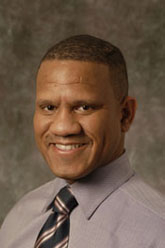Symposium sponsored by the Rutgers Center for Race and Ethnicity and the Princeton University to take place March 26 and 27

Addressing racial inequality in the Obama era will be the focus of a symposium this week at Rutgers and Princeton universities. The symposium, sponsored by the Rutgers Center for Race and Ethnicity and the Princeton University Program in Law and Public Affairs, will include scholars from a range of disciplines who will examine issues such as educational attainment, economic inequality, civil rights. and crime and punishment. The symposium takes place March 26 at the Assembly Room of Winants Hall and March 27 at Robertson Hall in Princeton. For more information, click here. Alvin B. Tillery Jr., an assistant professor in the Department of Political Science, in the School of Arts and Sciences, told Rutgers Today that the symposium aims to bring together a community of scholars to discuss the continuing racial disparities and to help shape public policy solutions.
Rutgers Today: What made you want to explore race and the Obama presidency at this time?
Tillery: We wanted to ask the question: Despite the great symbolic achievement of the election of Barack Obama, where do we really stand in terms of group equality? If you look at the data, it’s very clear that certain groups, particular people of color, still lag very far behind their fellow Americans. So how do we make sense of this great moment of progress, and yet still live with all these sweeping inequalities?
Rutgers Today: How will the symposium address such a complex topic?
Tillery: As academics, we often stand off to the side, and make pronouncements and policy prescriptions, but we rarely have moments where we come together and talk about ideas and talk about how we, as a community of scholars, can help shape these debates. What we wanted to do is to bring together people working on these issues, have them talk about their research, and then say, ‘if you had five minutes in a room with President Obama, what would you like to tell him?’ What would you suggest to him about how he might close these gaps, which are so vast? For example, 40 percent of African-American men between the ages of 18 and 40 in places like Washington D.C. are unemployed.
Rutgers Today: Is the symposium going to be a way to evaluate the Obama administration’s approach to race?
Tillery: We don’t want to get into a situation of grading President Obama. There’s a lot of that going on now. There are those of us who have some concerns about the president’s approach to these issues. I think President Obama, like many of the modern presidents since FDR, has taken the approach that the best way to fix racial inequality is to take these limited, targeted measures, but to stay mostly race neutral. We are not going to be issuing some blanket statement about the president doing either A work or F work. But what we do want to do is ask ‘What is he doing in this area and what are ways in which he can improve? How can we through our research provide alternative ideas that might help fix this problem?
Rutgers Today: The flyer announcing the symposium refers to the “tensions and contradictions” at the heart of the election of Obama. What are those tensions and contradictions?
Tillery: If President Obama were the run-of-the mill centrist Democrat, I don’t think he would have been able to go to the NAACP convention in July of 2008 and give a speech about personal responsibility and parenting as the key solutions to black inequality, and get a rousing round of applause. Part of what is going on here is that the symbolic value of President Obama to many people, but particularly to minority communities, has given him something of a pass. He still has a ton of political capital in this area. He doesn’t need to be aggressively promoting policy options. But then what is the symbolic value of an African-American president who can’t talk about racial inequality without worry or fear of losing his electoral coalition?